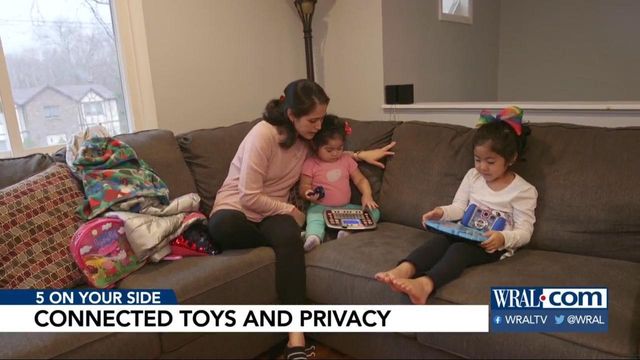Protect your data: What parents need to know about WiFi-connected toys
Experts say parents of teenagers, elementary school children and even teenagers need to be cautious when it comes to WiFi-connected toys.
Posted — UpdatedExperts say parents of teenagers, elementary school children and even preschoolers need to be cautious when it comes to WiFi-connected toys.
According to a Consumer Reports study, wireless-connected toys can ask for names and birth dates and even require a password, and that information could lead to trouble if it lands in the wrong hands.
"Parents should be aware that connected toys are just like any other kind of Internet of Things," said Bree Fowler, a technical editor with Consumer Reports. "They're connected to your router, which goes to the internet. And they have the ability to collect information and send it back and forth."
As more and more toys use WiFi, there are more chances for parents' data to be hacked.
It sounds alarming, but remember -- information can't be stolen or shared if you don't hand it over in the first place. "Toys will often ask for things like your child's name or address or age, but you have to remember that hackers can use this information," Fowler said. "So there's nothing wrong with giving a fake birthday or using a child's nickname instead of their real name."
In addition to using false information, Consumer Reports recommends that parents set strong passwords on connected toys by using a string of random words.
Better yet? Experts say use a password manager since connected toys aren't just toys. "Basically, these items can be used as a gateway into your computer network, and you need to make sure everything is locked down," Fowler said.
Experts know it may be harder to control settings on toys and gadgets belonging to teenagers and older kids.
"Kids that are older may be setting up their own accounts whether it's for gaming or a coding toy that they might be using at school," Fowler said. "So we need to teach them as well to protect their personal information. Parents need to sit their kids down and talk to them about appropriate behavior and appropriate sharing."
Not sure what to say? Consumer Reports recommends comparing your kids' digital behavior to real world. For example, you can have them read some negative texts or social media posts out loud. You both may be surprised at how hard it can be to actually say the things kids type.
In addition to protecting their data, remind kids not to encourage bad behavior by liking, commenting or re-sharing negative posts.
• Credits
Copyright 2024 All Consumer Reports material Copyright 2017 Consumer Reports, Inc. ALL RIGHTS RESERVED. Consumer Reports is a not-for-profit organization which accepts no advertising. It has no commercial relationship with any advertiser or sponsor on this site. For more information visit consumer.org (http://consumer.org/)





